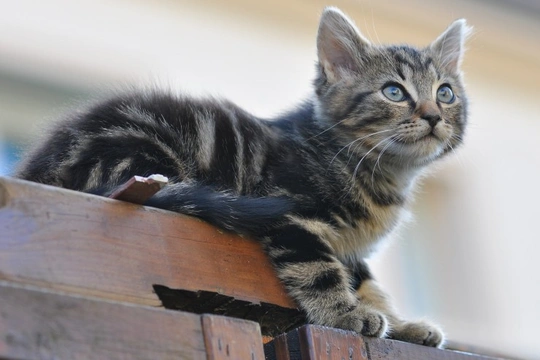
Is it a good idea to feed stray or feral cats?
Cats are remarkably skilled at seeking out homes willing to offer food and shelter. Sometimes, even cats with loving owners move to new homes they find more appealing!
In the UK, while feral cats are less common than in some countries, there remain many stray and unowned cats roaming local neighbourhoods. Most cat lovers will know a few strays nearby and naturally want to lend a helping hand.
Feeding stray cats or providing winter shelter is a compassionate impulse, but it is important to understand the consequences of such actions. Does feeding truly help, or might it create problems? This guide explores the differences between stray and feral cats, the risks involved in feeding them, and the best ways to assist these animals responsibly without causing harm to your own pets or the wider community.
Stray or Feral Cats: Understanding the Difference
A stray cat is an individual that once had a home but became lost, abandoned, or wandered away. They tend to be familiar with humans and may be approachable or friendly.
In contrast, a feral cat has usually never been owned by people and lives wild, often in colonies. Feral cats are generally wary of humans and avoid contact, except sometimes viewing people as a source of food.
Understanding this distinction is key, as it affects how you might safely interact and assist these cats, and influences their socialisation and welfare needs.
Is the Cat Really Stray? Checking for Ownership
Many cats use a clever strategy of turning up at different homes seeking extra meals. Sometimes the cats you see begging may already have a caring owner somewhere nearby.
Signs that a cat is likely owned include a collar, good grooming and body condition, consistent feeding times, and visible microchipping checked by a vet. If you suspect a cat is lost or belongs to someone else, try to help reunite it with its family before starting to feed it regularly.
This approach prevents encouraging dependency or territorial disputes and ensures that you are not inadvertently feeding a neighbour’s pet without permission.
Consider Your Own Cat's Boundaries
Feeding strays in your garden can be stressful for your own cat by inviting unfamiliar intruders onto their territory. While some cats tolerate visitors, others may become upset or anxious.
Before offering food to a stray or feral cat, reflect on your cat’s wellbeing to maintain a peaceful household and reduce conflict risks.
Potential Health Risks from Stray and Feral Cats
Strays and feral cats generally lack regular vaccinations and flea or worm treatments. They may carry parasites or infectious diseases that could affect your own cat’s health.
To protect your pet, keep their vaccinations & parasite preventatives up to date. Regularly check your cat for bite or scratch wounds that might indicate fights with unknown cats.
Spaying and Neutering: Key to Population Control
Unneutered stray or feral cats contribute to overpopulation, causing greater numbers of litters and increased pressure on local ecosystems and communities.
Many animal charities run Trap-Neuter-Return (TNR) programmes, where feral cats are humanely trapped, neutered, vaccinated, marked by an ear tip, and then returned to their colony. This reduces unwanted breeding, limits nuisance behaviours, and improves the overall health of feral populations.
If you encounter unneutered strays or feral cats, contacting local animal charities or vets can help enrol them in a TNR programme.
How to Help Stray and Feral Cats Responsibly
If you want to assist stray or feral cats kindly without encouraging problems:
- Feed only malnourished cats, preferably once daily with suitable food such as wet cat food or tuna.
- Maintain a consistent feeding schedule and location to monitor their health and condition.
- Remove any leftover food promptly to avoid attracting wildlife or pests to your property.
- Ensure feeding occurs in your own space without disrupting your pets’ territory.
- Contact trustworthy animal rescue charities or vet clinics for advice about TNR, veterinary treatment, or rehoming if cats are friendly.
Charities like the RSPCA or UK Cats work hard to improve the welfare of strays and ferals through neutering, medical care, and finding good homes for approachable cats.
What Impact Does Feeding Have?
Feeding stray or feral cats can provide critical nourishment, especially for those in poor condition. However, feeding without accompanying population control efforts often results in larger colonies and increased nuisance problems, such as territorial fighting and damage to property.
It can also attract entire feral colonies to your home, making it harder to manage their needs and potentially drawing unwanted wildlife.
Therefore, feeding should always be paired with neutering and veterinary care coordinated through local groups to ensure a balanced, humane approach.
Summary: Feeding Stray or Feral Cats - Good or Bad?
Feeding stray or feral cats is a delicate issue without a simple yes or no answer. It can be an act of kindness that saves lives if done thoughtfully, with awareness of the animals’ health and reproductive status.
However, feeding alone may create more problems than it solves if cats are not neutered or managed carefully. It is essential to work alongside animal welfare organisations to address the long-term needs of these cats and prevent overpopulation.
Remember, being a responsible neighbour and pet owner means balancing compassion with practical action for the benefit of all cats and community members.



